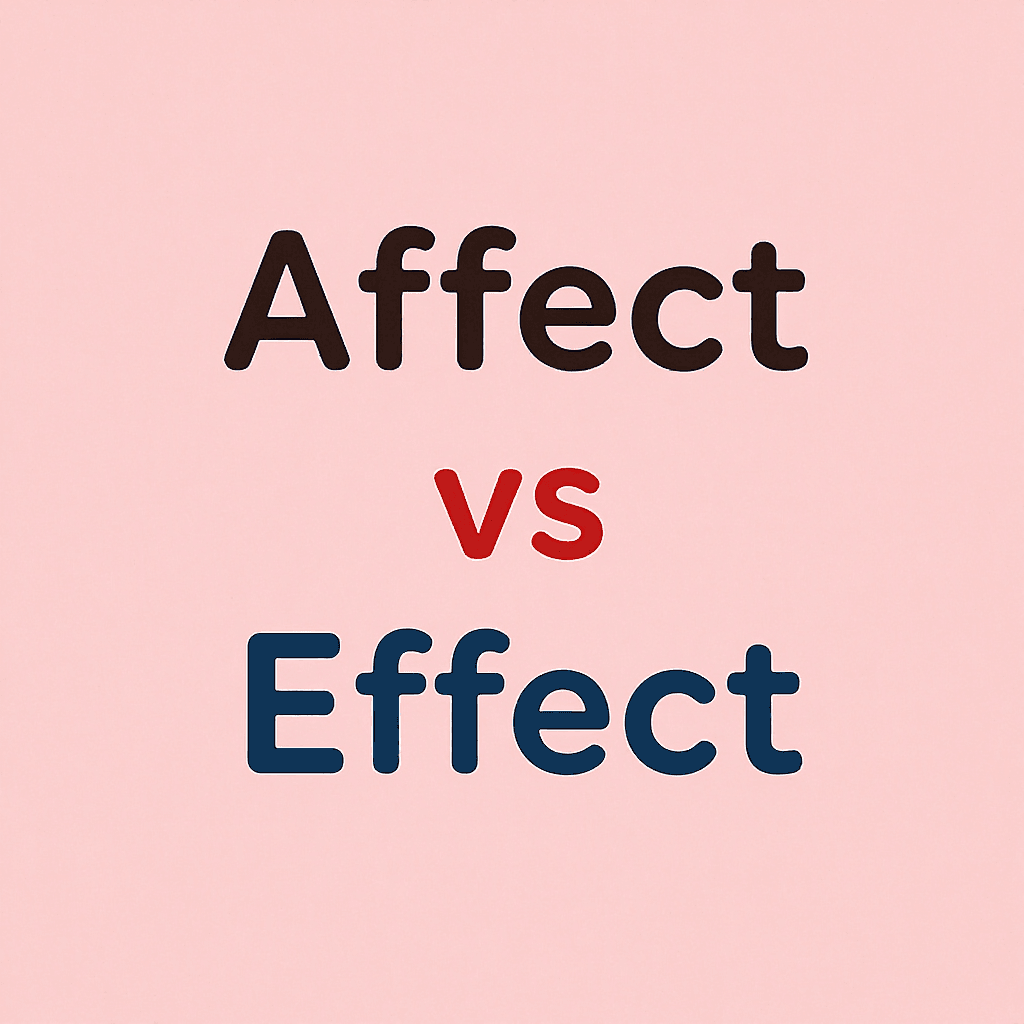Affect vs Effect: What’s the Difference?
 These two tiny words confuse even native speakers. Affect and effect sound similar and are related in meaning — both deal with change — but they play different roles in a sentence.
These two tiny words confuse even native speakers. Affect and effect sound similar and are related in meaning — both deal with change — but they play different roles in a sentence.
Let’s break it down step-by-step, with plenty of examples to make it stick.
Affect: The Action (Verb)
“Affect” is almost always a verb, meaning to influence or to make a change in something.
Think of “affect” as the action that causes the change.
Meaning
When something affects another thing, it has an impact or influence on it.
Examples of Affect (10 total)
- The cold weather affected my mood all week.
- His speech affected everyone in the audience.
- The new law will affect small businesses the most.
- How will this decision affect your future plans?
- The rain affected the outcome of the baseball game.
- Lack of sleep can affect your focus.
- Pollution affects air quality in big cities.
- The movie’s ending deeply affected me.
- Stress affects how well you think.
- The teacher’s kindness affected her students’ confidence.
🧠 Quick tip:
If you can replace the word with “influence,” then “affect” is correct.
The storm influenced traffic = The storm affected traffic.
Effect: The Result (Noun)
“Effect” is usually a noun, meaning the result or outcome of an action.
If affect is the cause, effect is the result.
Meaning
An effect is what happens because of something else.
Examples of Effect (10 total)
- The new rule had a positive effect on productivity.
- That movie had a lasting effect on me.
- The medicine’s side effects were mild.
- The effect of sunlight on plants is easy to see.
- His apology had no effect on her decision.
- The new design created a powerful visual effect.
- The speech had a strong emotional effect.
- The effects of climate change are already visible.
- Technology has a huge effect on how we learn.
- Laughter can have a healing effect on people.
🧠 Quick tip:
If you can replace the word with “result,” then “effect” is correct.
The result was good = The effect was good.
A Simple Trick to Remember
- Affect → Action (verb)
- Effect → End result (noun)
Try remembering:
“A comes before E — the Action happens before the End result.”
Common Mistake Alert
Sometimes “effect” can also be a verb meaning to bring about (like “to cause something to happen”), but it’s rare and formal:
- The new manager effected major changes in the company.
- The protest effected a shift in policy.
Unless you’re writing something official, stick to the simple rule above.
How AI Often Gets It Wrong
AI tools sometimes mix up affect and effect because they look at sentence structure statistically, not emotionally.
For example, an AI might choose “effect” when “affect” fits the human tone better.
That’s where tools like Humanizey come in — it rewrites your AI text to sound naturally human, fixing subtle word-choice errors that make writing sound robotic.
Quick Comparison Table
| Word | Part of Speech | Meaning | Example | |------|----------------|----------|----------| | Affect | Verb | To influence or change | The weather affects my mood. | | Effect | Noun | The result or outcome | The new rule had a big effect. |
FAQ
1. Is “affect” always a verb?
Mostly yes. In psychology, it can be a noun meaning “emotion,” but in everyday writing, it’s a verb.
2. Can “effect” ever be a verb?
Yes, rarely — it means “to bring about.” Example: to effect change.
3. How do I know which one to use?
If you’re describing an action → “affect.”
If you’re describing the result → “effect.”
4. Why does this matter in humanized writing?
Because real human writing has emotional rhythm and tone accuracy. Using the right word shows understanding — something AI tools often miss. Humanizey makes that difference clear.
